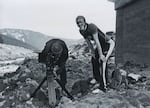The opening scene of the documentary film ”Sam Now” features the film’s titular character, Sam Harkness, in a wild array of scenarios.

Sam Harkness, age 12, plays an angsty adolescent in Reed & Sam’s third film, "Sam Three", B&W Super-8mm, 1999
Reed Harkness
He’s battling an inflatable whale, pretending to fly with cardboard wings, and squaring off against homemade robots in a blue superhero mask. These home movie clips are shot by Sam’s half-brother, Portland filmmaker Reed Harkness, who directed “Sam Now.” It’s the form the rest of this deeply personal film will take: one brother on-screen, acting out the drama; the other behind the camera, documenting and guiding us through the narrative. But while these opening images are whimsical and playful, they contrast the anguish at the heart of “Sam Now.”
In January 2000, with no warning, Sam’s mom Jois suddenly disappeared.
“Everyone assumed she’d come back, but she didn’t come back,” Reed Harkness narrates in the film. “She didn’t call or write either. It stayed like that for years, and I was really worried for my brother. Nobody was doing anything or even talking about it.”
This sudden loss is the true beginning of “Sam Now,” a story that spans over two decades. The movie touches on the ways trauma can pass down through generations — and the stories we tell ourselves about why our families are the way they are.
The Sam Films
Reed Harkness, who was eight years older than his brother, filmed five so-called ‘Sam Films’ as the two were growing up. “Sam was always so charismatic,” he said. “He kind of just had this thing, where if you turn the camera on him, he would come even more alive and do something fun and interesting.”
After the sudden disappearance of Sam’s mother, an unspoken hurt began to settle over the family. Reed Harkness noticed the toll the loss was taking on his brother, and that no one felt comfortable speaking about the disappearance. He filmed interviews with Sam about the loss, but the teenager was tight-lipped.
“We started off just making these playful fiction films, and then there’s this elephant in the room,” Reed Harkness said, “this big family secret.”
“I didn’t really have a way to talk to Sam about these things. Young Sam, he’s not really connecting with his emotions, and for a good reason. He’s had to kind of learn to shelter himself. So, our conversations are about music. Our conversations are about movies. Our conversations aren’t really about the heaviness of like, abandonment and grief.”
The big adventure

Sam Harkness, age 19, dressed as his alter ego, The Blue Panther, on Mount Hood in 2005.
Reed Harkness
In the film, after two and a half years, Reed Harkness realizes that he might be able to help his brother come to terms with the disappearance by creating a new project. He pitches his brother on a new film, using Sam’s superhero alter-ego: The Blue Panther Finds His Mother.
They’d received a tip that Jois might have moved to Southern California and begun a new life, with a new family. The film becomes the vehicle for the two to explore their loss.
“Part of it was always something might not ever come of this,” Reed Harkness said. “We might just be going on a long road trip and nothing ever happens.”
As they discuss filming, they laugh imagining the possibilities. “I’ll go in, and you keep the car running,” Sam schemes. “Then I’ll go in, I’ll knock on the door and run,” he says, collapsing into laughter at the absurdity of the idea.
To both of their surprise, though, the plan works.
In one scene, Sam stands on a beach in Southern California with a cell phone in his hand. He seems amused by the absurdity of this long-shot attempt to find his mother, with whom he hasn’t spoken in three years.
“Hello, may I speak with Jois?” he asks calmly. “…Mom??? Hi!! This is Sam! Hey, me and Reed are in California! We, we decided to come get you, or find you. Just, because we wanted to go on an adventure!”
After years of imagining where Jois had gone, the brothers discover she is indeed alive and well, with a new partner, living in southern Oregon.
Skeletons in the closet
The loss of a loved one is crushing, but it also provides a certain clarity: What we once had is now gone.
But what happens when you rediscover that same person? How do you reconcile after being abandoned? This becomes the central question of “Sam Now.”

Filmmaker Reed Harkness
Reed Harkness
“In the early days at the beginning of the film, I’m basically acting like a detective and I’m trying to interrogate my family about where Jois might be,” Reed Harkness said. “As the movie develops, I realize that there are burning questions that I have that I need answers to. And that involves uncovering these skeletons in the closet.”
After reconnecting with Jois, Reed Harkness continued to document his family’s attempts to move ahead over the next decade. There are tearful reunions, tense conversations, and plenty of soul-searching.
“Throughout 25 years of filmmaking, there have been all kinds of stuff that’s happened in our family,” Reed Harkness said, “and different times when it wasn’t right to film, and different times when it was completely right to film.”
The project thrust him into the role of being the chronicler of family history.
“The strangest part of it all is not the experience of having a camera and inserting into family situations,” he said, “but the experience of holding everybody’s story, being the recipient of everybody’s story within my family, and keeping that until now.”
Broaching the conversation
As learn more about Jois’ own tragic backstory, “Sam Now” paints a portrait of how the cycle of trauma can move between generations.
“I can see the chain,” Reed Harkness said. “I can see how this is a cyclical thing where Jois felt abandoned. Sam feels abandoned. Sam wants to try to break that cycle.”

Sam Harkness, age 30, gives Reed an update from a rowboat on Lake Washington over a decade after they began searching for his mom in 2015
Reed Harkness
The film doesn’t resolve with a storybook Hollywood ending; this is a real story about a real family, after all. But Reed Harkness lights up when asked how his brother is doing today. Sam is a social worker in Seattle, working to help others who’ve grown up in challenging situations.
“He understands a lot about what’s happened for him and he is trying to help other people,” Reed Harkness said. “But at the same time, he also understands that there’s no magic bullet, there’s no clean way to repair things.”
After premiering earlier this year at the Hot Docs film festival in Toronto, “Sam Now” has been making the rounds on the festival circuit and will screen in Portland on Aug. 5. PBS audiences will be introduced to the film next spring, as part of the Independent Lens series.
But for Reed Harkness, the greatest legacy of the film is the conversations he’s seen it spark among audience members about the secrets that exist within all of our families, and the difference that we can all make by having the courage to launch a difficult conversation.
“I wouldn’t say it’s a call to action, but it presents the idea that like, hey — maybe there’s somebody you want to talk to now,” he said. “Why not? You know, why not?”

"Sam Now" is screening Friday, August 5th in Portland.
Reed Harkness
Sam Now is screening Friday, Aug. 5 at 7pm at the Portland Art Museum’s Whitsell Auditorium
